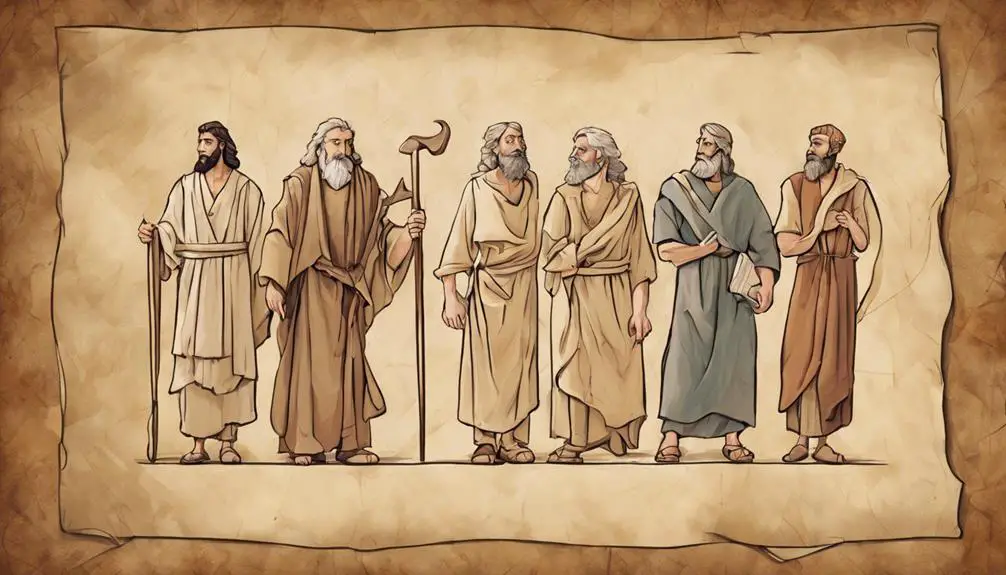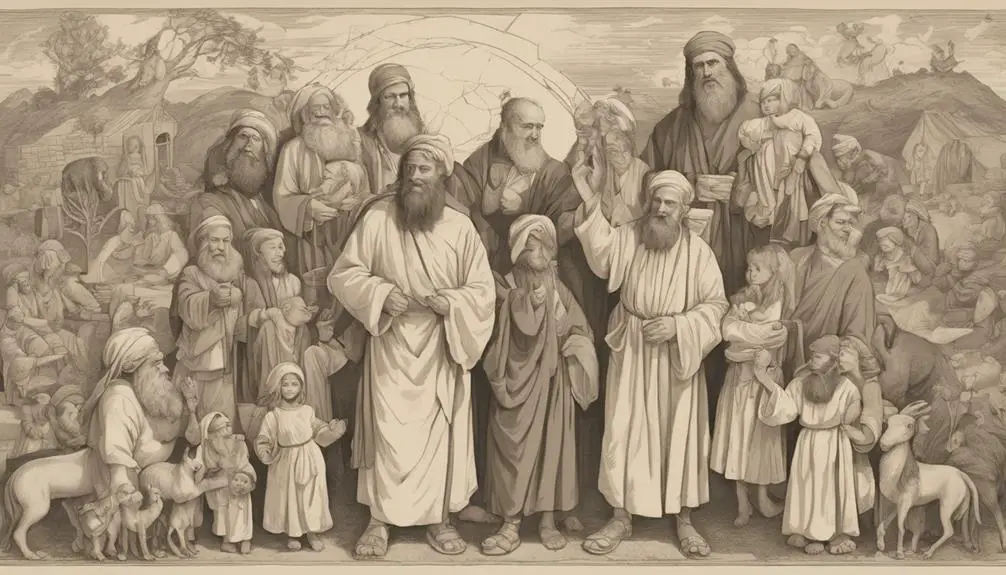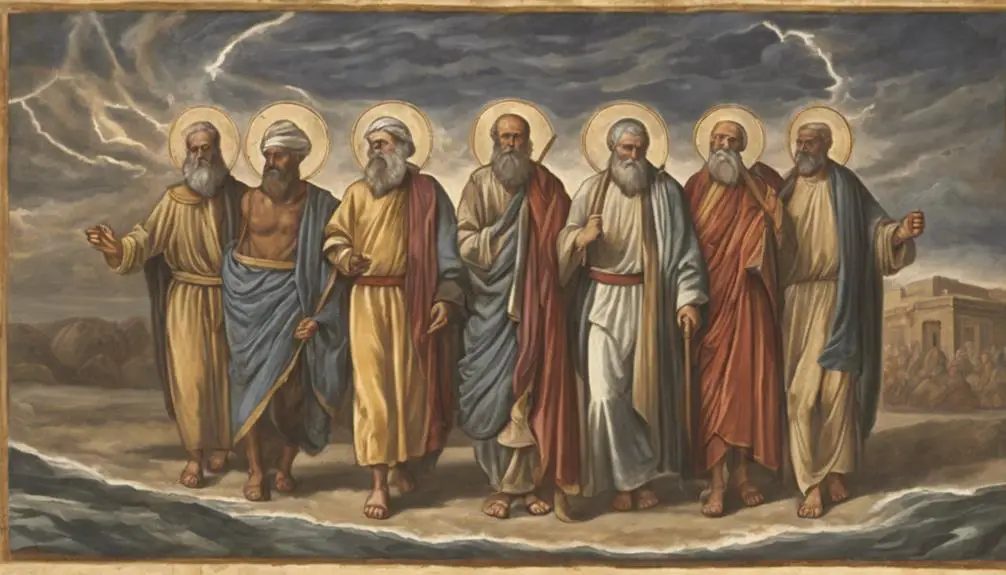Contemplate the compelling roles of various fathers in the Bible and their profound impact on biblical history.

Types of Fathers in the Bible
Biblical books brim with stories of different types of fathers—both literal and metaphorical. You've probably heard of patriarchs like Abraham, prophetic fathers like Samuel, or even kings who were fathers like David.
But, have you ever taken the time to explore how their roles as fathers shaped their actions and influenced the course of biblical history? There's so much to unpack here and it's quite fascinating as you start to connect the dots.
So, why not embark on this enlightening journey to discover the richness of fatherhood in the Bible?
Key Takeaways
- The Bible presents various types of fathers, including patriarchs, prophets, kings, and ordinary men, each with distinct leadership styles and lessons.
- Fatherhood in the Bible involves transformation, wisdom, guidance, faith, perseverance, and faced trials with resilience.
- Biblical kings as fathers left lasting legacies through their sons, shaping entire kingdoms and histories.
- Ordinary fathers in the Bible, irrespective of their status, manifested extraordinary faith and heroism, demonstrating the enduring power of faith in everyday life.
Patriarchs: The Founding Fathers

The Bible's patriarchs, often hailed as the founding fathers, provide a rich tapestry of fatherhood, each showcasing unique characteristics and lessons in their respective narratives. These figures embody the essence of Patriarchal Leadership, wielding authority with wisdom and compassion. Their narratives underscore the importance of moral fortitude, spiritual guidance, and familial unity.
Abraham, for instance, epitomizes Patriarchal Leadership. His obedience to God's commands, even when it meant potentially sacrificing his beloved son Isaac, exemplifies trust in divine providence. Isaac, in turn, passes on Ancestral Blessings, a critical aspect of patriarchal fatherhood, to his son Jacob, thereby securing continuity of divine promises.
Jacob, despite his flawed character, is yet another illustration of the profound influence of patriarchal guidance. His transformative journey from a trickster to the father of the twelve tribes of Israel showcases the transformative power of grace and repentance.
In essence, the patriarchs' narratives highlight the complex dynamics of fatherhood: the joys and trials, the sacrifices and rewards, the burden of leadership, and the legacy of Ancestral Blessings. So, as you delve into their stories, you'll discover not only historical narratives, but timeless lessons on leadership, faith, and fatherhood.
Prophetic Fathers and Their Roles

Shifting our focus from the patriarchs, let's now explore the prophetic fathers and their distinct roles in biblical narratives. Prophetic fathers, in this context, refer to those biblically prominent figures who weren't only physical fathers but also spiritual guides. They're known for their prophetic wisdom and fatherly prophecies, which shaped the course of biblical history.
These fathers had a unique ability to envision the future, interpret divine messages, and offer guidance. Their roles were multi-faceted; they were nurturers, leaders, and spiritual mentors. Thus, they wielded significant influence not only over their offspring but also their communities.
Look at figures like Abraham and Isaac. They weren't just patriarchs but also prophetic fathers. Their prophecies, filled with wisdom and foresight, guided their people towards divine paths. They used their prophetic wisdom to provide fatherly advice, ensuring the spiritual growth of their children and community.
However, being a prophetic father wasn't an easy task. It demanded obedience to God, spiritual discernment, and self-sacrifice. It required them to balance physical and spiritual fatherhood, a task that was challenging yet fulfilling. This combination of earthly and spiritual roles made these prophetic fathers integral to the biblical narrative.
Kings as Fathers in Biblical Times

Have you ever wondered about the role of kings as fathers in biblical times? Royal lineage exploration offers an intriguing perspective. Kings were not just rulers, but fathers who shaped kingdoms and histories through their offspring.
The father-son succession dynamics were robust and compelling. A king's legacy was often defined by the ability of his sons to carry on the royal lineage and maintain the kingdom.
Consider this table:
King |
Son |
Dynasty |
|---|---|---|
David |
Solomon |
Israel |
Rehoboam |
Abijah |
Judah |
Ahab |
Ahaziah |
Israel |
David, a man after God's own heart, passed his throne to Solomon, known for his wisdom. Rehoboam, Solomon's son, succeeded him but his harsh rule caused a kingdom split. Ahab, infamous for his wickedness, was succeeded by Ahaziah who continued his father's evil ways.
The table clearly shows that the king's character and actions profoundly influenced his son's reign, shaping the destiny of their kingdom. Thus, a king's role as a father was pivotal. They were instrumental in establishing dynasties and setting the course of their nation's history.
Ordinary Fathers With Extraordinary Faith

Beyond the realm of royalty, ordinary men with extraordinary faith also fathered future generations in the biblical era, profoundly impacting their families and communities through their devout lives. These men, often overlooked in the grand narrative of the Bible, exhibited faithful perseverance and ordinary heroism in their roles as fathers.
You see, it's not just the kings and prophets who shaped the biblical narrative, but also these unsung heroes. One such example is Jairus, a synagogue leader, who despite his common status, demonstrated extraordinary faith when his daughter fell ill. His faithful perseverance in seeking Jesus for a miracle, even against societal norms and expectations, shows the depth of his faith and love for his child.
These fathers' ordinary heroism lies in their unyielding faith, amidst trials and tribulations. Their steadfast belief in God's providence, even when circumstances seemed bleak, sets a powerful example for current and future generations. Their lives underscore the truth that faith isn't confined to the extraordinary but can be found in the ordinary, everyday actions of a father's love and commitment.
These ordinary fathers with extraordinary faith are a testament to the enduring power of faith that transcends status and circumstance.
Fathers' Trials and Triumphs in the Bible

As you delve deeper into the scriptures, you'll find that the Bible is replete with stories of fathers who faced daunting trials and ultimately emerged triumphant. These narratives aren't mere tales but offer profound Fatherhood Lessons and insights into Biblical Paternity.
Consider Abraham, the patriarch, who faced the horrifying trial of sacrificing his son Isaac. Despite the heart-wrenching ordeal, his unwavering faith in God's promise led him to triumph, thereby setting a foundation for future generations.
Then there's Job, a quintessential example of enduring trials. Despite losing everything, his faith remained unshaken, and he emerged victorious, regaining more than he lost. His story is a testament to the resilience and fortitude inherent in fatherhood.
David, the shepherd turned king, faced numerous trials, from battling Goliath to evading King Saul's wrath, and even dealing with rebellion within his own family. Yet, he triumphed over these trials through faith and repentance, demonstrating the strength and humility that define Biblical Paternity.
These fathers' trials and triumphs provide invaluable lessons in determination, faith, and resilience. They highlight the fact that fatherhood, as depicted in the Bible, isn't about being perfect but about striving, enduring, and triumphing despite imperfections and challenges.
Frequently Asked Questions
What Is the Significance of Fatherhood in the New Testament?
In the New Testament, fatherhood holds significant symbolism. It's not just about biological lineage; it also conveys a deep, spiritual paternal legacy.
You see, fatherhood represents God's love, guidance, and protection for His children. It's a powerful metaphor for understanding our relationship with the divine.
How Did the Concept of Fatherhood Evolve Throughout the Different Books in the Bible?
In studying the Bible, you'll notice the concept of fatherhood evolve significantly across its books. Initially, you see patriarchal influences heavily dominating. Leaders like Abraham and Isaac embody this.
As you progress, fatherhood takes on deeper spiritual dimensions, marked by fatherly sacrifices, notably seen in God's sacrifice of His son, Jesus.
You'll appreciate how changing societal norms and evolving religious beliefs shape this critical familial role.
Are There Any Examples of Fathers Who Failed in Their Roles According to the Bible?
Certainly, the Bible presents examples of fathers who stumbled in their roles. You can see David's shortcomings as a father in how his children turned out.
Another example is the Prodigal Son's father, who might be criticized for his perceived leniency.
It's important to note, however, that these stories often provide lessons on grace, forgiveness, and the complexity of human relationships.
How Is the Relationship Between Fathers and Daughters Depicted in the Bible?
In the Bible, the relationship between fathers and daughters often reflects both daughter empowerment and biblical patriarchy.
You'll find instances where fathers actively empower their daughters, like Jacob blessing his daughter Dinah.
Yet, the patriarchal culture is evident in stories where daughters are given in marriage without consent.
What Are the Teachings About Fatherhood in Non-Christian Religious Texts, Like the Quran or Torah?
You're now shifting focus to Quranic Paternal Roles and Torah's Fatherhood Principles. Both texts emphasize the importance of a father's guidance, love, and discipline.
In the Quran, fathers are seen as protectors and providers. Similarly, the Torah stresses a father's role in child education and moral upbringing. They're not just parents, but teachers and role models.
Conclusion
In conclusion, the Bible presents a diverse range of fatherhood exemplars, from patriarchs and prophets to kings and ordinary men of faith. Each type embodies unique trials, triumphs, and spiritual lessons. They all demonstrate a profound commitment to God, shaping history and defining values.
Their stories continue to inspire and challenge us, reminding us of the critical role fathers play in the spiritual and moral development of their families and communities.



Sign up